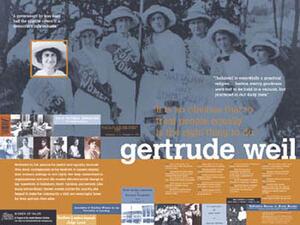10 Things You Should Know About Gertrude Weil
-
Gertrude Weil was born in Goldsboro, North Carolina in 1879. Her father, an immigrant from Germany, was among the business and civic leaders of the community. At the age of 15, she was sent to Horace Mann High School in New York City. She went on to Smith College, where, in 1901, she became the first graduate from North Carolina.
-
Although Weil wanted to stay in New York and work as a teacher, her family persuaded her to return home. She joined the Sisterhood of Temple Oheb Shalom and the North Carolina Federation of Women’s Clubs. She was active in the women’s club movement until about 1915, when she began to focus her energies on women’s suffrage.
-
The question of women’s suffrage was particularly contentious in the South, where there were even more restrictions on women than in other parts of the United States. The issue was further complicated for Jews by the case of Leo Frank, a Jewish man who was found guilty of murdering a young girl who worked in the Georgia factory he managed. Even though his sentence was commuted, he was seized by a mob and lynched. Many southern Jews tried to keep a low profile in the aftermath of Frank’s murder; Gertrude Weil did not hesitate to move to the forefront of the women’s suffrage campaign.
-
Despite the efforts of Weil and the other members of the North Carolina Equal Suffrage League, North Carolina voters refused to ratify the 19th Amendment, which enfranchised women. After the amendment was adopted in 1920, Gertrude Weil led the North Carolina League of Women Voters.
-
Inspired by Jewish teachings that "justice, mercy, [and] goodness were not to be held in a vacuum, but practiced in our daily lives," Weil stood courageously at the forefront of a wide range of progressive and often controversial causes— not just women's suffrage, but labor reform and civil rights.
-
In 1929, female textile workers in North Carolina went on strike to protest the long hours, low wages, and poor working conditions that had long been endemic in the state. Women's groups, with Gertrude Weil in the lead, strongly supported the strikers. She joined a group of progressive citizens, a third of them women, who issued a manifesto in support of collective bargaining and free speech. In 1931, women workers finally succeeded in winning shorter hours, a prohibition on night work, and other workplace improvements.
-
Gertrude Weil first immersed herself in civil rights work in the early 1930s when she joined the Association of Southern Women for the Prevention of Lynching. These women rejected the argument that lynchings of black men were necessary to protect white women, insisting they had no need or desire to be "protected" in this way.
-
Well into her 80s, Gertrude Weil continued her activism, supporting efforts to integrate schools and other facilities. Long after most white families had left the area, she continued to live in downtown Goldsboro, regularly inviting her black neighbors to visit. In 1963, she convened a Bi-Racial Council in her home.
-
The Weils were unusual among southern Reform Jews in being strong Zionists. Mrs. Weil was a personal friend of Henrietta Szold, and Gertrude and her mother were founding members of Goldsboro's Hadassah chapter. Gertrude was also active in the NC Association of Jewish Women, the board of the North Carolina Home for the Jewish Aged, and the National Federation of Temple Sisterhoods. She contributed time and money to numerous Jewish causes, including efforts to rescue Jewish refugees from persecution in Europe.
-
In 1900, Gertrude Weil's mother wrote, "My greatest desire for my children is to feel...that the world will be better for their having lived, not great things but good is what I wish them to do." Gertrude certainly fulfilled her mother's hopes. Although she never held elective office, this “citizen-activist” had a greater impact on her community than the vast majority of political officials.








